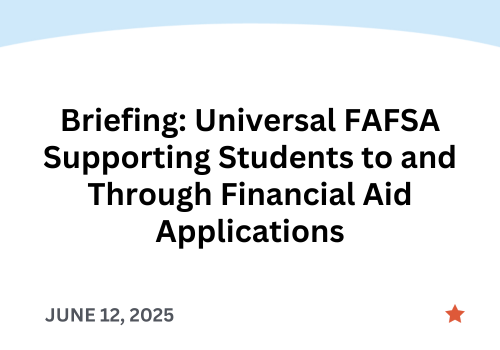News
Briefing: Universal FAFSA Supporting Students to and Through Financial Aid Applications
June 12, 2025
By Femi Stoltz
.png)
FOR IMMEDIATE RELEASE: June 12, 2025
Contact: Femi Stoltz, Massachusetts Policy Director, uAspire
femis@uaspire.org
MASSACHUSETTS – On June 12, members of the legislature, student-serving organizations, and college students convened at the Massachusetts State House to draw attention to the importance of comprehensive state and federal financial aid application completion support. Speakers thanked the legislature for the passage of last year’s economic development bill, which included language ensuring information about forms of financial aid and postsecondary options will be provided to high school students prior to graduation.
Speakers included sponsors of HB1467/SB921: Senator Jo Comerford and Representative Andy Vargas. uAspire's Massachusetts Policy Director, Femi Stoltz, moderated a panel of expert practitioners who highlighted the need for legislation requiring financial aid form completion or opt-out as well as student support with the financial aid application process. Joshua Otlin, Principal of Milford High School emphasized that knowledge of financial aid “is a core and critical component of being college ready”. Genesis Carela of EdTrust in Massachusetts stated that these policies have “significantly contributed to increasing FAFSA submission and completion rates in the states where they have been implemented.”
Michele Rudy, Co-founder and Executive Director of Cultivate Pathways highlighted that this information is equally critical for students who are only eligible for state aid as she detailed her experience directly supporting students with the MASFA (Massachusetts Application for State Financial Aid), stating that, “for many MASFA-eligible students, the difference between attending college and not attending is someone being willing and able to walk them through the process”. Renata Mauriz, Director of Immigrant Student Support Services at Bunker Hill Community College agreed, stating that policies requiring financial aid application completion or opt out are “essential for maximizing student enrollment because prospective students are often reluctant to enroll at an institution without a clear understanding of how they will finance their education.”
Having supported students with both the FAFSA and MASFA, Amanda Rosario, College Affordability Advisor at uAspire noted that the FAFSA and MASFA forms “can be easy for some students, but those aren’t the students who need help.” Recent UMass Amherst graduate, Katherine Blasius, said her experience with financial aid, “is what drove me to study public policy. Now that I’m on the other side, I hope to make these processes more supportive for students who don’t have access to as much information or resources.”
Presenters also detailed new FAFSA data, pointing to the $63M in unused Pell funds left on the table as a result of Massachusetts students not completing the FAFSA in 2024 and highlighting completion gaps between low-income and non-low-income students in the Commonwealth.
The briefing was concluded by Alayna Blodgett of uAspire who called on the legislature to advance universal financial aid policies in Massachusetts to help “maximize recent investments in financial aid by ensuring that our students receive knowledge of, and support with financial aid applications.”
View the full briefing slides here.
For more information about universal FAFSA policies, visit: